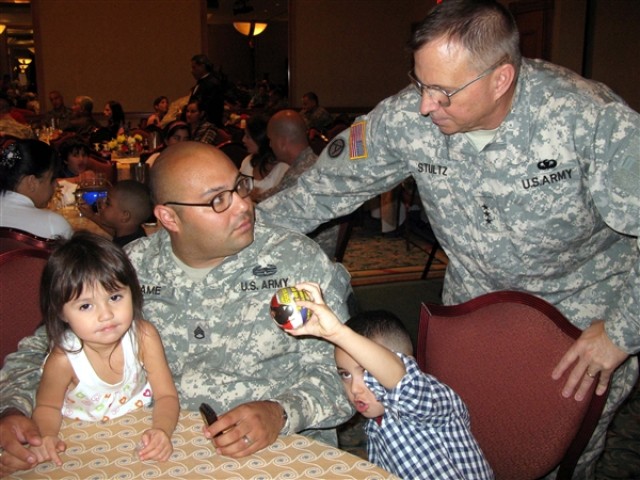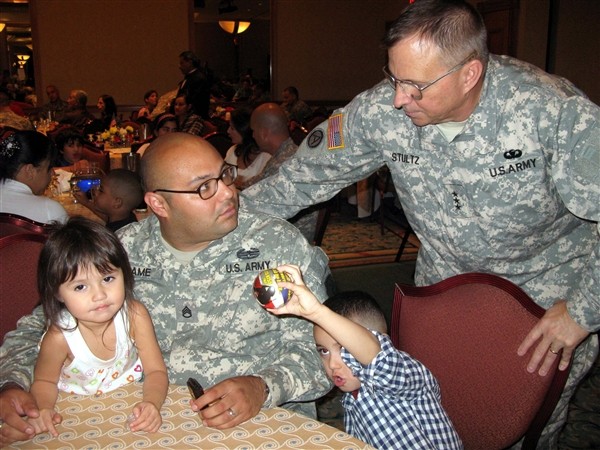
SAN JUAN, Puerto Rico, Nov. 1, 2010 -- Opening his address here to spouses of troops recently returned from Iraq, Lt. Gen. Jack C. Stultz, the Army Reserve's top-ranking officer, made an unexpected plea to what he recognizes as the best-qualified group to spot post-deployment problems early: "I need your help."
As the 1st Mission Support Command hosted a Yellow Ribbon Reintegration Program weekend for about 160 reservists and their families, Stultz called on spouses to encourage their loved ones who need it to take advantage of services available to help them readjust from combat deployments.
"My Soldiers are very, very, very proud," Stultz told spouses of the 166th and 210th Regional Support Groups' headquarters and headquarters detachments and the Rear Operations Center Detachment, all units that returned home to Puerto Rico within the past two months after year-long deployments in Iraq.
"Their pride gets in the way of them asking for help, because they think they are supposed to be strong," Stultz said. "We teach them 'Mission first.' We teach them 'We will not quit.' So they think asking for help is a failure. But a lot of our Soldiers need help."
"I need you to help me convince your Soldiers, if they need counseling, if they need help, it's OK," he added. "It's not a weakness."
The entire Army, and the military as a whole, is struggling to take the stigma out of getting help, the general said, but identifying troops in need and getting them to mental health care is particularly challenging in the Reserve Components.
Active duty troops take block leave after redeploying, he explained, and then begin training again together with their combat battle buddies who are likely to pick up quickly on telltale signs of distress. In contrast, he said, Reservists and National Guardsmen disperse to their separate civilian communities, where it's easier to keep their problems under wraps.
"My challenge is, now that your Soldiers are home, I only see them two days a month," Stultz told the spouses. "A lot of the times, I don't know what's going on in their lives the other 28 days. But you do. So I need your help."
Speaking to family members in a hotel conference room as their Soldiers attended another session, Stultz emphasized that there's no shame in reaching out for help, to a fellow Soldier, a spouse or a mental health professional.
"We, all of us, have some kind of post-traumatic stress," he said. "Notice I didn't call it 'disorder.' I just said 'post-traumatic stress.'"
"The Soldiers in the other room and you here in this room have been through a stressful experience, and it affects us in different ways," he continued. "It depends on what degree of stress we experience and it depends on how we handle it."
Attending the first of three Yellow Ribbon events for the Soldiers and their families after their redeployment, Stultz knew he was delivering his message at a particularly critical time.
"What we find very often is that, when the Soldier first comes home, the adrenaline is flowing," he said during an interview with American Forces Press Service. "There's excitement of being home, back with the wife, back with the kids, back in the community. They don't know they are hurting."
"Now is when that adrenaline is wearing off," he said. "Now is when they start thinking, 'wow, things are getting back to normal, and normal doesn't feel normal.'"
That's why the Yellow Ribbon Reintegration Program - a service-wide initiative for Reserve-Component members and their families, schedules the first post-deployment events 30 days after redeployment. The full program includes events throughout the deployment cycle, beginning at the alert phase, during the deployment, then at 30, 60 and 90 days after redeployment.
"I think the importance of the Yellow Ribbon program is to make sure that on the front end of deployment, we are properly preparing the Soldier and the family for everything they need to think about while their Soldier will be gone," Stultz said. "And then on the back end, it's making sure we are doing everything to reintegrate that Soldier and family and make them aware of all the resources that are available, not just immediately after deployment, but for the long term."
Over the weekend, the Reserve Soldiers and families gathered at San Juan's beachfront Intercontinental Hotel for their 30-day post-deployment event, where officials hoped they would pick up skills to help the Soldiers reintegrate with their families, civilian jobs and communities.
Reservists receive drill credit to attend the mandatory session, and the Army Reserve picks up the cost of travel, lodging and meals for the Soldiers and their families.
Although he's heard some people suggest that the sessions be conducted on a military installation to save money, Stultz said, the inviting venues make families want to participate and help to make the program so successful.
"You can't do it on the cheap," he said. "You have to pick a place where Soldiers and their families will want to go. You want a nice area where they can enjoy themselves, relax and spend time with their buddies and their family and listen to what we have to say."
Similarly, Stultz insisted that any Soldier who cross-trained into a unit for deployment must go through the Yellow Ribbon program with that same unit. The Army Reserve paid to fly several Soldiers and their families to Puerto Rico to participate in the weekend's events.
"Some people say they should be able to do Yellow Ribbon closer to their homes, but I take the opposite approach," Stultz said. "I say if they deployed as a unit, we want them to come home as a unit and go through Yellow Ribbon as a unit. I want the Soldiers to be able to look themselves in the eye and talk about what they have experienced as a group, what they are feeling as a group. Then they can go back."
Stultz said he believes Soldiers who served together during a deployment are far more likely to recognize when someone is experiencing problems.
"If I go back to a Yellow Ribbon event within my local town, and people may not know who I am, I say sit over there and remain quiet and they'll say, 'What's up with him' Maybe he's just a quiet guy,' then check the block that I have done Yellow Ribbon," he said.
"On the other hand, if I go back with my unit and I am sitting over in the corner, they are going to ask 'What's wrong''" Stultz said. "Somebody may remember that when he was deployed, he had a little problem with his wife. Somebody may say, 'We need to talk to him.'"
Army Master Sgt. Rodney Pearson, a drill sergeant from Fountain Inn, S.C., who cross-leveled into the 210th RSC for the deployment, said it felt great to reunite with his battle buddies for the Yellow Ribbon program as he and his family enjoyed a weekend in Puerto Rico.
"From day one, they pretty much adopted me as their brother in arms," he said of the 1st MSC Soldiers. "I think it's been really valuable to do a Yellow Ribbon event with the unit you deployed with, because they're the ones who know you, who have become your brothers. For me, this is like a family reunion."
When Pearson and his fellow Reservists weren't catching up with each other during the weekend session, they were picking up literature about benefits and services through federal and state governments, talking with civilian recruiters seeking job applicants or attending seminars on topics ranging from relationship-building to financial management.
Special sessions for spouses focused on how to help their loved ones readapt and recognize symptoms and characteristics that might signal a bigger issue, and on services for families that need additional support.
As the Defense Department seeks ways to improve efficiencies, Stultz said, he feels confident the Yellow Ribbon Reintegration Program, and other initiatives to support servicemembers and their families, will endure.
"Obviously, we will have to make sure it is funded, but it is very easy for me to defend this," he said. "It will save us in the long run from other problems we will have if we don't do it -- Soldiers we will lose and have to replace, behavioral issues, other problems.
"Prevention always saves in the long run," he said.
Barbara Rodriguez, wife of Army Command Sgt. Maj. Ariel Feliciano, the 1st MSC's first sergeant, said Stultz' presence at the command's Yellow Ribbon event spoke volumes.
"This demonstrates the emphasis the leadership puts on this program," she said. "It shows respect and validates the importance of these Soldiers and their families."

Social Sharing